Baritone Justin Austin posed amid projections of artwork by John Singer Sargent during a photo shoot for the Des Moines Metro Opera’s “American Apollo.” Photo: Duane Tinkey
Writer: Michael Morain
At a Boston hotel in 1916, the famous painter John Singer Sargent met a young Black elevator attendant named Thomas McKeller and invited him to his studio to pose for some paintings. They hit it off, and over the next few years Sargent transformed McKeller’s figure into white gods and goddesses in the murals at Boston’s Museum of Fine Arts, immortalizing his body even while his name almost slipped into obscurity.
A century later, the Des Moines Metro Opera plans to tell that true story in the upcoming world premiere of “American Apollo.” So Justin Austin, the German-born baritone who plays McKeller, sat for a portrait of his own downtown at the Fitch Building. A handful of creative technicians fussed around him in the dimly lit room, projecting examples of Sargent’s artwork across Austin’s bare chest and the wall behind him.
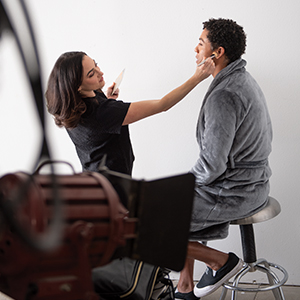
The opera company has elevated its promotional photos over the last decade or so to match the visual splendor of its shows, which return June 28 through July 21 at the Blank Performing Arts Center in Indianola. The team works months in advance, brainstorming concepts and figuring out all the logistics to conjure the look and feel of each production. They often use lighting and special effects to add a dash of magic to familiar landmarks like Hoyt Sherman Place, the World Food Prize Hall of Laureates or even Woodland Cemetery.
“We’re really proud of Des Moines,” said Kim Dragelevich, the company’s creative director. “We want people nationwide to look at these images and be surprised that Des Moines is producing something like this.”
Early planning allows the team — led by Dragelevich, executive director Michael Egel and photographer Ben Easter (who often contributes to dsm) — to feature each show’s stars instead of relying on illustrations or photos of models. And the opera world has taken notice; sometimes, cast members from all over the country politely jockey to be chosen for the promos.
Austin flew in for his shoot this winter, on a day off from a production in Chicago. “As a lyric baritone, it’s rare that I’m the centerpiece of the show,” he said while makeup artist Ivy Boyd brushed his torso with lotion.
At the time, he was starring in the boxing-themed opera “Champion” at the Lyric Opera of Chicago, which had plastered his face on billboards and buses throughout the city. A tenant in the building where he was staying told him, “I think I saw you four or five times on my way home.”
Austin is aware that he’s making a name for himself in a way that the elevator operator he portrays never could. “He was hidden for so long,” the artist said. “I’m just so honored to be the person to help uncover this man from history.”
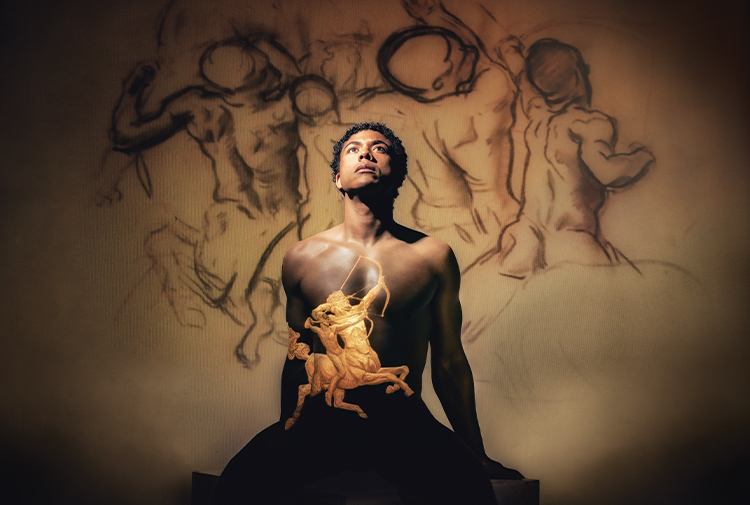
Justin Austin. Photo: Ben Easter
“Billy Budd,” 2017
To tell Herman Melville’s tale of unruly British sailors on the high seas, Des Moines Metro Opera turned its stage into a makeshift 18th century warship. But for the promo photos, they decided to get closer to the real thing. Egel arranged a shoot on a historic ship in Philadelphia while Craig Verm, the tenor in the title role, was in town for a stint with Opera Philadelphia.
The team shot Verm in various costumes and poses on the ship, venturing below deck and up in the crow’s nest while the wind was blowing under dramatic clouds. Afterward, they ventured over to an older ship that had been converted into a restaurant and started shooting photos as discreetly as possible. “Was there a sign that said ‘Do Not Cross’? I don’t remember. But it was just a matter of time before we were asked to leave,” Easter recalled. So they saved their riskiest shots for the end, when Verm climbed a rope ladder. “We had to get that shot,” Easter said. “It was too cool to pass up.”
Fun fact: That ship, the Moshulu, showed up in “Rocky,” during one of Rocky’s workout sessions along the waterfront, and “The Godfather: Part II,” when it brought the young Vito Corleone to the United States.
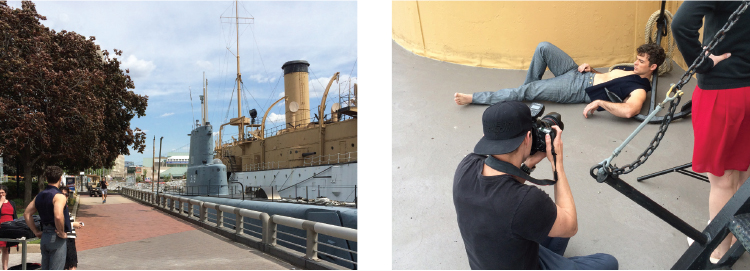

Photos: Courtesy of Des Moines Metro Opera and photographer Ben Easter
“Rusalka,” 2018
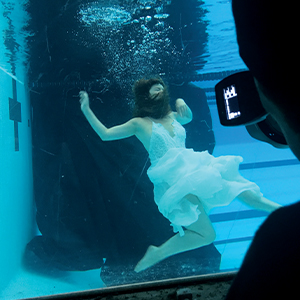 Directors have to get creative whenever they stage this underwater fairy tale that tells a story similar to “The Little Mermaid.” Fortunately, Easter had captained the Valley High School swim team and remembered an underwater window at the school’s pool.
Directors have to get creative whenever they stage this underwater fairy tale that tells a story similar to “The Little Mermaid.” Fortunately, Easter had captained the Valley High School swim team and remembered an underwater window at the school’s pool.
The opera crew dressed soprano Sara Gartland in a flowing dress and “threw her into the pool 10 or 12 times over the course of a couple hours,” said Easter, who photographed her through the window. The team rigged up a weighted tarp for a backdrop and enlisted various assistants to help both underwater and up on deck. If all else failed, Valley’s synchronized swimming was ready to jump in with wigs.
“You kind of dream of those moments,” Easter said. After the shoot, he passed his photos to creative director Dragelevich, who superimposed the images onto a second photo of a palatial room with a skylight and grand staircase. She spangled the scene with bubbles to complete the effect.
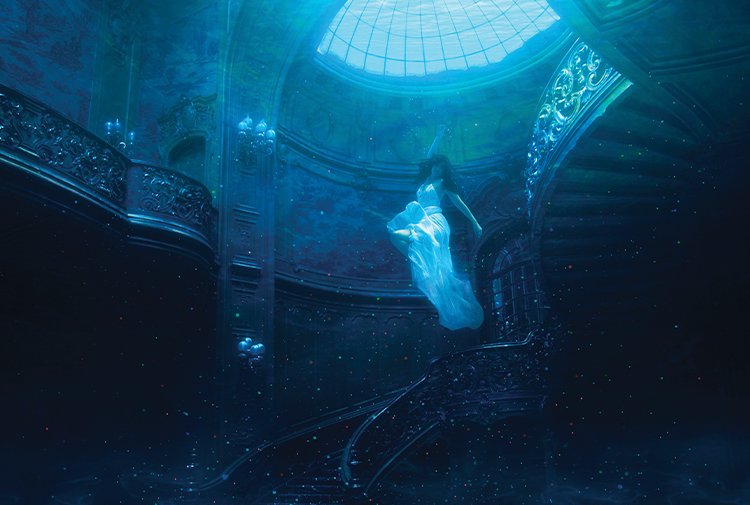
Photos: Courtesy of Des Moines Metro Opera and photographer Ben Easter
“Wozzeck,” 2019
Sometimes photo shoots happen before the stage director has fully dreamed up how the show will look on stage. In those cases, the promo team tries to create images that suggest a general mood or feeling without filling in too many specific details.
For “Wozzeck,” a rarely performed opera about a soldier’s descent into madness and death, Dragelevich imagined “something gloomy and surreal and psychological.” She spotted a spread in a fashion magazine that inspired the team to build a giant nest out of thorny branches and twigs. When director Kristine McIntyre saw it, backlit with baritone Michael Mayes and a halo of dry-ice fog, she liked it so much she added it to the actual show.


Photos: Courtesy of Des Moines Metro Opera and photographer Ben Easter
“A Midsummer Night’s Dream,” 2022
To create Shakespeare’s fairy-filled forest, the team enlisted the local florist Saley Nong. On a sweltering day in early summer, she brought in buckets of flowers and spread them out on a plastic tarp. At one point, “she was actually lying in mounds of dirt because she was pulling things out of the pots and putting them in, like a real garden,” Dragelevich said.
Since “Midsummer” doesn’t have a title character and the artists playing King Oberon and Queen Tytania had already been featured in promos for other shows, the creative team decided to focus on Liam Beck-O’Sullivan, the young actor playing Puck. They cobbled together an Elizabethan costume with pieces they bought on eBay or borrowed from the Des Moines Playhouse.


Photos: Courtesy of Des Moines Metro Opera and photographer Ben Easter
“The Love for Three Oranges,” 2023
The creative team had initially planned to feature a light-up vaudeville marquee to emphasize the comedy’s cheeky, helter-skelter energy. But they eventually decided to shoot photos at the Indianola home of the company’s late co-founder Robert Larsen, who had filled it over the years with eclectic props and antiques.
“We were told how chaotic the actual show is. It’s nonsense,” Dragelevich said. “We wanted to show things that didn’t really relate to each other until you actually saw the show.” For the promo shoot, they covered one of Larsen’s tables with random objects and a pile of fake oranges from Amazon.
The tenor Christopher Sokolowski, the show’s prince, was so eager to participate that he flew in overnight from Zurich, posed for the shoot (despite the jetlag) and flew back the next day. Sometimes, whimsy works best under tight deadlines.
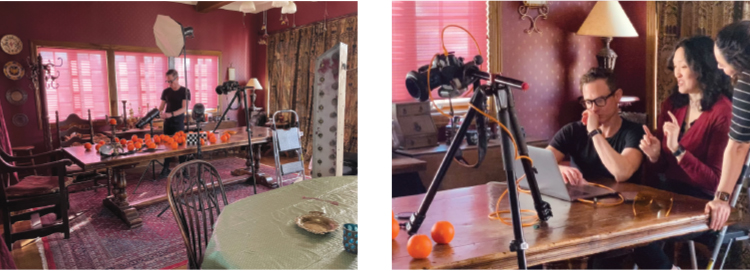
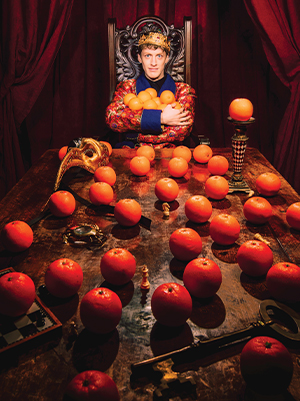
Photos: Courtesy of Des Moines Metro Opera and photographer Ben Easter











